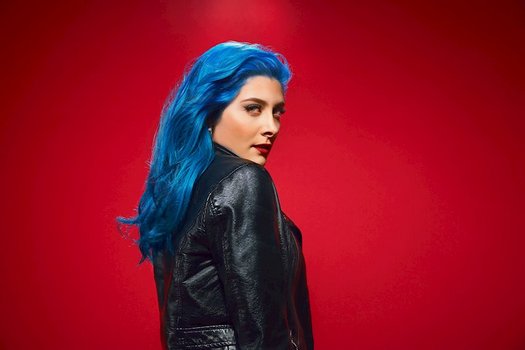Diamante – Independence and Dreams
Tuesday, 11th May 2021
Truly coming in hot with her debut, Diamante captured an older spirit of hard rock and found a way to twist and tweak it into something more modern. Some big touring opportunities followed her debut, until the pandemic came crashing in of course. Newly independent and ready to scale larger challenges, Diamante returns with her sophomore effort American Dream. A release that augments her writing in every possible way, with energetic hard rock numbers, tender ballads, and everything in between. We spoke with Diamante herself about going the independent route, all things American Dreams, fan connections, and even the future of rock.
Dead Rhetoric: What made you decide to go the independent route for American Dream?
Diamante: At first, it wasn’t really up to me [laughs] in the sense that I didn’t know that the label I was with wasn’t going to pick up album 2. I was just sort of writing because I was going through a heartbreaking moment in my life, and I kind of felt I had to write and get it out there. I had all of these songs in my back pocket, so when I learned that the label wasn’t going to pick up the album it wasn’t going to deter me in any way. I had the music, so I figured I would release it myself and see what happens.
Dead Rhetoric: So there was never a thought of just shooting for a new label?
Diamante: No, not at first. I kind of took the opportunity as a moment of freedom since I had been with the label for a few years and I had released my first album there. I took advantage of the fact that this might be a cool opportunity to do something on my own.
Dead Rhetoric: How do you feel that you’ve grown since Coming in Hot?
Diamante: I would say that I’ve grown the most as a songwriter. I think sonically too, there’s huge growth from Coming in Hot. Some songs are heavier, the ballads are a little more soft-leaning, but there’s a lot of growth. In the songwriting, I feel these songs are more honest than the ones on Coming in Hot. There was honesty in those songs, but the ones on American Dream are more brutal, more personal – there’s a lot of self-awareness and me calling myself out, which you don’t hear on my first album. I was always writing from a place of empowerment and strength and on this album, I wanted to also write from the position of when you don’t feel your best and when you feel vulnerable. I think that’s also very powerful in itself.
Dead Rhetoric: I noticed the extremes too. It almost feels like there is more personality with the tracks. It runs the gamut, I guess. So was that intentional?
Diamante: Yeah, I think so. Even if it was just at a subconscious level. Since the album was done independently, I didn’t have to follow any rules or regulation. I could do whatever I wanted. So I wanted to be as Diamante as possible and tap into all sides of me. I wanted the rock songs to be heavier. I also love pop music, so I wanted to encompass that as well.
Dead Rhetoric: Do you think specifically about playing live when you write?
Diamante: Yeah, I think that was also a factor. When I wrote Coming in Hot, I had only done one or two tours. I hadn’t considered what the songs would sound when I played them live. Turns out, when I did go play those songs live, they sounded a lot heavier. A lot of people came up to me and told me things like, “Wow, I didn’t know you guys rocked this hard! I listened to the album but I had no idea it would sound like that!” So I think this time around, I wanted to take that live energy and sound and incorporate it more into the recorded album.
Dead Rhetoric: Can you speak about the use of colors on the album and press photos. It seems like there’s a bright contrast, particularly with the blue of your hair and the red background.
Diamante: American Dream was the last song I ended up writing for the album. Up until then, I didn’t have an idea for the album title. When I wrote that song, I knew that would be the name of the album. It has the meaning of being independent, it has my personal story of my parents coming to the US and if they hadn’t come here I wouldn’t be doing what I am doing now. So I loved the title, and I’m rocking this blue hair, right? So I had to have red. What was really cool with this album process was that I got to be completely hands on with designing the album cover. I shot the album cover with Kevin Baldes, the bass player for the band Lit. We shot it in his garage. It was very DIY and lowkey. I got to really be hands on with the design, down to the font and shade of the red. It all encompassed that Americana side.
Dead Rhetoric: So with the DIY thing, you could feel yourself coming out in all aspects of the album…not just the music?
Diamante: Yes, I always tell people that the first album was an introduction to me as an artist, and this album is more of an introduction to me as a human being. It’s both really exciting and terrifying at the same time [laughs].
Dead Rhetoric: The last time we talked, you weren’t quite sure about sticking with the blue hair. Is blue hair something you are more or less stuck with at this point?
Diamante: I don’t know. I kind of look at it like, I’m not sick of it yet. I’m starting to get that itch, that feeling of “What do I want to do next?” because I have had this hair for 5 years. But I still love it and I think with American Dream it tied in perfectly. So I’m keeping the blue hair for now but who knows. Maybe for album three I’ll make a drastic change [laughs]!
Dead Rhetoric: Discuss your interactions with Howard Benson in terms of finding your sound and moving forward.
Diamante: I think both album processes were very different. When I first met Howard, I was only 18 at the time. I was super nervous, especially because I had never worked with a producer of that caliber, I had never made a full-length album before, I had been newly signed – so there were a lot of firsts for me. I did really grow a lot in that album process. He really taught me how to be a better songwriter, how to emote better in the vocal booth, and the thing that is different with this album is that since there is no label, no A& R, there’s not that level of separation that we did have on the first album. This time around, it is more Howard and I collaborating and calling the shots, as opposed to the label calling the shots. This time around, Howard and I would sit around, with Neil [Sanderson] who co-produced the album, and we would talk about which songs were strong enough to be on the album, which songs needed work, and which ones were a no. It was so much more liberating and I felt so much more creative. I felt I actually had a voice.
Dead Rhetoric: You’ve done a few streaming concerts during the pandemic. Have you found it to be a successful way to make it through?
Diamante: Especially in this last year, I missed playing shows so badly. I felt I had to do something to feel connected to the fans, and wanted to put on a show. I did do two live stream concerts, and although they are nothing in comparison to the real thing, it has definitely helped me get through this past year. I was feeling disconnected from being a performer, so it was really fun for me.
Dead Rhetoric: Do you feel that your openness with fans has helped you to gain more success? I am thinking back to when you were playing shows and seeing the pictures of lines of people coming up to meet you after a gig.
Diamante: I love that and I miss that so much. That’s my favorite thing about playing shows – getting to meet everyone afterwards, taking photos and hearing their stories or hearing how my music has helped them in some way. I miss that the most. I think that’s what has kept everyone so close – I have made posts about ‘show me a picture of a time we met’ or ‘show me a picture of us at a show’ and it brings us all back together. I can’t wait to get back out there and do that again.
Dead Rhetoric: What’s the future of rock music in your eyes?
Diamante: I am very optimistic about the future of rock music. I think it’s really cool that genres are really getting blurred. It’s cool to see artists who are more generally more pop or hip hop start to do more rock-oriented things. In that way, younger kids who may not know as much about rock music are getting exposed to it. I don’t think rock ever really went away, because if you go to these festivals there are thousands of people so you know it never died, but it is making this really cool comeback with the younger people, and people who don’t necessarily listen to rock music.
Dead Rhetoric: What’s planned for the rest of this year?
Diamante: Right now, I have a few festivals booked. I have only announced one, which is Inkcarceration Festival. I am so excited to play it, because I have seen these line-ups year after year and I am finally going to get to do it, hopefully. If all goes according to plan. So a few festival dates, and hopefully touring in 2022 to support the album, that would be awesome. There are more music videos too. I shot some really amazing music videos that are going to come out after the album. Then probably more music soon after, because I’m just nonstop writing.
Dead Rhetoric: So the music videos, with the DIY piece – how much of the process are you working with?
Diamante: At this point, it’s been so much fun because I have a more hands on role with them. I shot three videos with Nayip Ramos, who is incredible. I worked with him with the video for “Coming in Hot.” When it was time to think about music videos for this album, he was the first person I thought of and we really got to just brainstorm and go back and forth. It was really fun to be more involved with these videos.

























